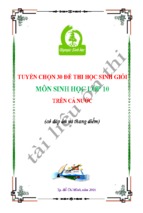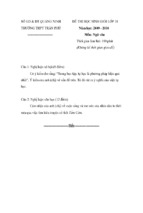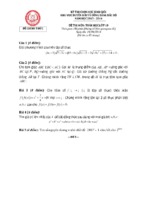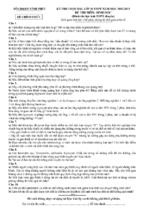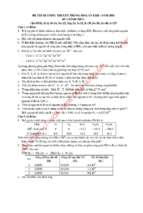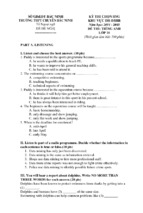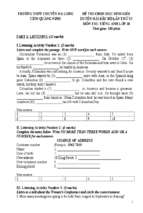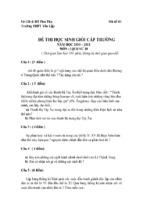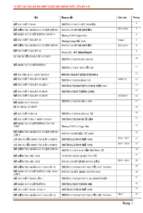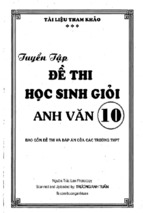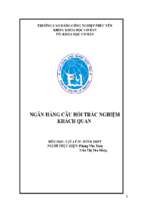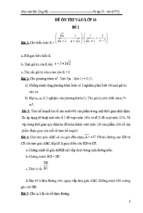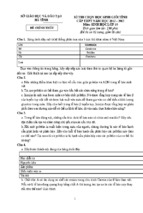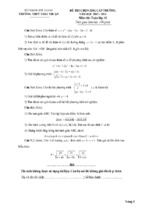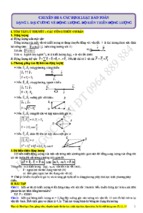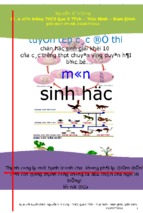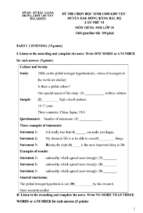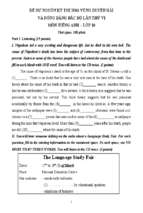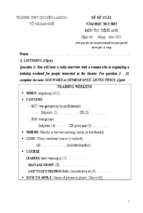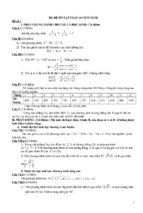TRƯỜNG THPT CHUYÊN
QUỐC HỌC – HUẾ
KỲ THI HỌC SINH GIỎI KHỐI 10
KHU VỰC DUYÊN HẢI VÀ ĐỒNG BẰNG
BẮC BỘ LẦN THỨ VI
Môn: TIẾNG ANH
PART 1: LISTENING (15 marks)
1. Complete the sentences below. Write ONE WORD ONLY for each answer. (5
marks)
1. On his dog sled, the command Jeremy used most often with the dogs was _________.
2. Jeremy’s dogs could understand commands in Finnish and ________________, as
well as English.
3. When traveling by sled, Jeremy tried to focus on the _____________ of the lead dog.
4. The lead dog is always intelligent and generally ________________.
5. Each dog can pull a weight of ________________ kilos.
6. Jeremy had to avoid getting hit by ______________ of trees when riding among trees.
7. At lunchtime, Jeremy’s job was to get ________________ for cooking.
8. To Jeremy, traveling on a skidoo is like being on a speed ________________.
9. Jeremy liked the skidoo except for the fact that it was ________________.
10. The good thing about riding a skidoo is that your ________________ don’t get cold.
2. Complete the sentences below. Write NO MORE THAN THREE WORDS for
each answer. (5 marks)
1. David feels that progress on the project has been slow because other members of the
group are not ________________________________.
2. Jane thinks that ________________________________ were not clearly established.
1
3. Dr Wilson suggests that the group use the ________________________________
available from the Resource Center.
4. David doubts that the research will include an adequate ______________________.
5. According to Dr Wilson, the ________________________________ is now the most
important thing to focus on.
3. Choose the answer A, B, C or D which fits best according to what you hear. (5
marks)
1. What does Rupert say about the fact that he is doing ballet classes?
A. Other people have ridiculed him for it.
B. He expects to be mocked for it.
C. It is not as unusual as people may think.
D. People may think it isn’t really true.
2. Rupert says that before he started doing ballet lessons
A. he had been doing routine physical fitness training.
B. his knowledge of ballet had been growing.
C. ballet had taken over from football as his greatest interest.
D. he had been considering doing ballroom dancing again.
3. Rupert says that when the idea of ballet lessons was suggested to him,
A. he thought it was a joke.
B. he was unsure exactly what would be involved.
C. he began to have unrealistic expectations of what he could achieve.
D. he initially lacked the confidence to do it.
4. One of the advantages of ballet that Rupert mentions is that
A. it leads to fewer injuries than other physical activities.
B. it has both physical and mental effects.
2
C. it is particularly good for certain parts of the body.
D. it is more interesting than other forms of exercise.
5. What does Rupert say about the sessions?
A. The content of them is varied.
B. Some of the movements in them are harder than others for him.
C. All of the movements in them have to be done accurately.
D. They don’t all involve basic movements.
PART 2: GRAMMAR AND VOCABULARY (35 marks)
1. Choose the word or phrase which best completes each sentence. (10 marks)
1. It’s nearly impossible to ____________ up a meeting because people are all free at
different times.
A. arrange
B. make
C. set
D. take
2. It’s quite out of ____________ for Paul to behave so terribly.
A. temperament
B. personality
C. nature
D. character
3. She doesn’t like to keep anything hidden: she always ____________ her mind.
A. talks
B. speaks
C. tells
D. says
4. Despite all the evidence, he wouldn’t admit that he was in the ____________.
A. fault
B. error
C. wrong
D. slip
5. It’s impossible to get ____________ of him! He’s never there!
A. feel
B. contact
C. hold
D. touch
6. He ____________ this city down so much that I don’t know why he doesn’t leave.
A. holds
B. pulls
C. talks
D. runs
7. I’m afraid Mr. Logan isn’t in the office today, but I can ____________ you through to
his secretary.
A. put
B. get
C. switch
D. run
3
8. He is held in high ____________ by everyone who works with him.
A. reputation
B. respect
C. regard
D. renown
9. Sheila had butterflies in her ____________ before the interview.
A. face
B. heart
C. palms
D. stomach
10. ____________ he caught his plane; he hasn’t phoned to say anything went wrong.
A. Presumably
B. Supposedly
C. Assuming
D. Granted
11. He was ____________ more and more impatient as the time passed.
A. showing
B. developing
C. seeming
D. growing
12. I thought I had made it ____________ that I didn’t wish to discuss this matter.
A. distinct
B. plain
C. frank
D. straight
13. It really gets me ____________ having to work so much overtime.
A. down
B. up
C. on
D. by
14. It was a bad mistake but it had no ____________ on the outcome of the match.
A. bearing
B. relevance
C. significance
D. repercussion
15. We are looking for self-motivated people who can ____________ the initiative.
A. do
B. take
C. get
D. make
16. We took such a great ____________ to the place that we decided to go and live
there.
A. affection
B. fondness
C. liking
D. attraction
17. A Personnel Manager has to be experienced ____________ dealing with people.
A. with
B. for
C. on
D. in
18. She works very hard and finds it difficult to ____________ when she gets home.
A. give in
B. switch off
C. let out
D. wind up
19. I was worried but their reassurances put my mind at ____________.
A. rest
B. comfort
C. calm
D. relief
20. She is highly-skilled ____________ making high-quality furniture.
4
A. to
B. for
C. in
D. on
2. The text below contains 10 mistakes. Underline the mistakes and write their correct forms in the
space provided in the column on the right. (0) has been done as an example. (5 marks)
Less than 40 years ago, tourism has been encouraged as an
0. _________was________
unquestionable good. With the arrival of pack holidays
1. ____________________
and charter flights, tourism could at last be enjoyable by the
2. ____________________
masses. Yet one day, it seemed feasible that there will be no
3. ____________________
more tourists. There will be ‘adventurers’, ‘fieldwork
assistants’, ‘volunteers’ and, of course, ‘travelers’. But the
term ‘tourist’ will extinct. There might be those which
quietly slip away to foreign lands for nothing other than pure
pleasure, but it will be a secretive and frowned at activity.
No one will want to own up to be one of those. In fact,
there are already a few countries prohibiting tourists against
entering certain areas where the adversity effects of tourism
4. ____________________
5. ____________________
6. ____________________
7. ____________________
8. ____________________
9. ____________________
10. ____________________
have already struck. Tourists have charged with
bringing nothing with them but their money and wreaking
havoc with the local environment.
3. Fill in each space with one suitable preposition or particle. (5 marks)
1. I find it hard not to surrender _______________ the temptation of having a chocolate
ice-cream whenever I spend my time in the café.
2. My assistant will stand _______________ for me while I’m away.
3. After a three month training period Celia gave up the nursing course ____________
the grounds of having no vocation for this kind of work.
4. The carpet is designed to stand up _______________ a lot of wear and tear.
5
5. _______________ reference to the waste disposal, I’d like to suggest a less
troublesome solution.
6. Real problems cropped _______________ when it became clear that my business
partner had vanished with all the money.
7. The bank owner has been _______________ conflict with the accountants since he
decided to lower their salaries.
8. The news about Sue’s pregnancy leaked _______________ quickly despite her effort
to keep it secret.
9. Why is she so critical _______________ my pronunciation? Doesn’t she know I’m
not a native speaker of German?
10. He’s always running her _______________ in front of other people.
4. Fill in each space with the correct form of the word in brackets. (5 marks)
1. Rescuers made _______________ efforts to save the crew. (hero)
2. _______________ to animals is a punishable offence in many countries. (cruel)
3. I wonder which party is going to put forward Mr. Colton’s _______________ in the
next election? (candidate)
4. You must have forgotten to _______________ the iron before leaving the house and
therefore the fire broke out. (connect)
5. I insist Robert be replaced by a more gifted speaker. His poor pronunciation and his
_______________ voice drive everybody crazy. (monotony)
6. It is _______________ to expect them to be able to solve the problem immediately.
(real)
7. Vandalism used to be a rare _______________ here. (occur)
8. The brochure will be ready for _______________ in September. (publish)
9. Within the last few decades the computer has become the most _______________
piece of equipment in the office. (dispense)
6
10. According to the cardiologists his heart defect is _______________, yet he may live
with it until he is hundred. (cure)
5. Read the text below and think of the word which fits each space. Use only one
word in each space. (10 marks)
Vitamins are good for our health, aren’t they? Perhaps not. New research suggest that
rather than ward off disease, high doses of certain vitamins may (1) _______________
more harm than good and could even put you in an early grave. A variety of recent
studies suggest that (2) _______________ from improving health, these vitamins, when
taken in very high doses, may actually increase the risks of cancer and a range of
debilitating diseases, a discovery that has sent the medical world into a spin. Scientists
are unsure (3) _______________ to why vitamins, so essential to health, can be toxic in
high doses. The most likely explanation is that the body is only equipped to deal with
the levels found naturally in the environment. If the intake is too far above the normal
range, then the body’s internal chemistry can be shunted out of alignment. (4)
_______________ this means is that the commercially sold vitamins and (5)
_______________ provided by nature are not always compatible. The commercial
forms may interfere with the body’s internal chemistry by ‘crowding out’ the (6)
_______________ natural and beneficial forms of the nutrients. The vitamins obtained
(7) _______________ food are also allied with a host of other substances which may
moderate (8) _______________ augment their activity in the body. The latest advice (9)
_______________ to eat a balanced diet to ensure you get all the nutrients you need, and
if you must take supplements make (10) _______________ you take the lowest
recommended dose and follow the instructions on the bottle.
PART 3: READING (30 marks)
7
1. Read the text below and decide which answer A, B, C or D best fits each space.
(10 marks)
THOMAS COOK
Thomas Cook could be said to have invented the global tourist industry. He was
born in England in 1808 and became a cabinet-maker. Then he hit on the idea of using
the newly-invented railways for pleasure trips and by the summer of 1845, he was
organizing commercial trips. The first was to Liverpool and (1) ____________ a 60page handbook for the journey, the (2) ____________ of the modern holiday brochure.
The Paris Exhibition of 1855 (3) _______ him to create his first great tour, taking
in France, Belgium and Germany. This also included a remarkable (4) ____________ Cook’s first cruise, an extraordinary journey along the Rhine. Nothing like this had been
available before, but it was only the beginning. Cook had invented (5) ____________
tourism and now became a pioneering giant, striding across the world, traveling
incessantly, researching every little detail before being absolutely confident that he
could send the public to (6) ____________ his steps.
Cook was not slow in thinking beyond Europe, and he turned his gaze upon Africa.
The expertise he had gained with his pioneering cruise along the Rhine in 1855 (7)
____________ him in good stead when it came to organizing a fantastic journey along
the Nile in 1869. Few civilians had so much as (8) ____________ foot in Egypt, let (9)
____________ traveled along this waterway through history and the remains of a
vanished civilization (10) ____________ back thousands of years. Then, in 1872, Cook
organized, and took part in, the first conducted world tour. The whole adventure took
222 days and the world of travel has not been the same since.
1. A. featured
B. presented
C. highlighted
D. inserted
2. A. pioneer
B. forerunner
C. prior
D. foretaste
3. A. livened
B. initiated
C. launched
D. inspired
8
4. A. breakthrough
B. leap
C. step
D. headway
5. A. common
B. whole
C. wide
D. mass
6. A. retreat
B. retrace
C. resume
D. retrieve
7. A. kept
B. took
C. stood
D. made
8. A. set
B. placed
C. laid
D. put
9. A. apart
B. aside
C. alone
D. away
10. A. flowing
B. going
C. running
D. passing
2. Read the following passage and choose the best answer A, B, C or D for each
question. (10 marks)
The days of the camera-toting tourist may be numbered. Insensitive travelers are
being ordered to stop pointing their cameras and camcorders at reluctant local residents.
Tour companies selling expensive trips to remote corners of the world, off the welltrodden path of the average tourist, have become increasingly irritated at the sight of
visitors upsetting locals. Now one such operator plans to ban clients from taking any
photographic equipment on holidays. Julian Matthews is the director of Discovery
Initiatives, a company that is working hand-in-hand with other organizations to offer
holidays combining high adventure with working on environmental projects. His trips
are not cheap; two weeks of white-water rafting and monitoring wildlife in Canada cost
several thousand pounds.
Matthews says he is providing ‘holidays without guilt’, insisting that Discovery
Initiatives is not a tour operator but an environmental support company. Clients are
referred to as ‘participants’ or ‘ambassadors’. ‘We see ourselves as the next step on from
eco-tourism, which is merely a passive form of sensitive travel - our approach is more
proactive.’
9
However, says Matthews, there is a price to pay. ‘I am planning to introduce tours
with a total ban on cameras and camcorders because of the damage they do to our
relationships with local people. I have seen some horrendous things, such as a group of
six tourists arriving at a remote village in the South American jungle, each with a video
camera attached to their face. That sort of thing tears me up inside. Would you like
somebody to come into your home and take a photo of you cooking? A camera is like a
weapon; it puts up a barrier and you lose all the communication that comes through
body language, which effectively means that the host communities are denied access to
the so-called cross-cultural exchange.’
Matthews started organizing environmental holidays after joining a scientific
expedition for young people. He subsequently founded Discovery Expeditions, which
has helped support 13 projects worldwide. With the launch of Discovery Initiatives, he is
placing a greater emphasis on adventure and fun, omitting in the brochure all references
to scientific research. But his rules of conduct are strict. ‘In some parts of the world, for
instance, I tell people they should wear long trousers, not shorts, and wear a tie when
eating out. It may sound dictatorial, but I find one has a better experience if one is well
dressed. I don’t understand why people dress down when they go to other countries.’
Matthews’ views reflect a growing unease among some tour companies at the
increasingly cavalier behavior of well-heeled tourists. Chris Parrott, of Journey Latin
America, says: ‘We tell our clients that indigenous people are often shy about being
photographed, but we certainly don’t tell them not to take a camera. If they take pictures
without asking, they may find themselves having tomatoes thrown at them.’ He also
reports that increasing numbers of clients are taking camcorders and pointing them
indiscriminately at locals. He says: ‘People with camcorders tend to be more intrusive
than those with cameras, but there is a payoff - the people they are filming get a
tremendous thrill from seeing themselves played back on the viewfinder.’
10
Crispin Jones, of Exodus, the overland truck specialist, says: ‘We don’t have a policy
but, should cameras cause offence, our tour leaders will make it quite clear that they cannot
be used. Clients tend to do what they are told.’
Earthwatch, which pioneered the concept of proactive eco-tourism by sending
paying volunteers to work on scientific projects around the world, does not ban cameras,
but operates strict rules on their use. Ed Wilson, the marketing director of the company,
says: ‘We try to impress on people the common courtesy of getting permission before
using their cameras, and one would hope that every tour operator would do the same.
People have to be not only environmentally aware but also culturally aware. Some
people use the camera as a barrier; it allows them to distance themselves from the reality
of what they see. I would like to see tourists putting their cameras away for once, rather
than trying to record everything they see.’
1. In the first paragraph we learn that Discovery Initiatives ____________.
A. offers trips that no other tour company offers
B. organizes trips to places where few tourists go
C. has decided to respond to its customers’ complaints
D. has already succeeded in changing the kind of tourist it attracts
2. Julian Matthews thinks that the function of the company is to ________.
A. get people involved in environmental work
B. influence the way other tour companies operate
C. inform holidaymakers about environmental damage
D. co-operate with foreign governments to promote eco-tourism
3. What does Matthews say in paragraph 3 about cameras and camcorders?
A. They give local people a false impression of holidaymakers.
B. They discourage holidaymakers from intruding on local people.
C. They prevent local people from learning about other societies.
11
D. They encourage holidaymakers to behave unpredictably.
4. The word ‘horrendous’ in paragraph 3 is closest in meaning to _____________.
A. disgraceful
B. offensive
C. pitiful
D. horrific
5. What is Matthews keen for clients to realize?
A. that certain behavior may spoil their enjoyment of a trip
B. that they may find certain local customs rather surprising
C. that it is likely that they will not be allowed in certain places
D. that the brochure does not contain all the information they need.
6. Which of the following does Chris Parrott believe?
A. Tourists are unlikely to agree to travel without their cameras.
B. Local people may react angrily towards tourists who use cameras.
C. Tourists are becoming more sensitive about their use of cameras.
D. Camcorders always cause more trouble with local people than cameras.
7. The word ‘indigenous’ in paragraph 5 is closest in meaning to _____________.
A. timid
B. native
C. impoverished
D. ignorant
8. Crispin Jones says that his company _____________.
A. expects its staff to prevent problems over the use of cameras
B. seldom encounters problems regarding the use of cameras
C. is going to decide on a firm policy regarding the use of cameras
12
D. advises clients about the use of cameras before they leave
9. The word ‘courtesy’ in the last paragraph is closest in meaning to _____________.
A. dignity
B. elite
C. politeness
D. nobility
10. Which of the following best summarizes the view of Earthwatch?
A. Too many tour operators ignore the problems caused by cameras.
B. Most tourists realize when they have caused offence to local people.
C. There are more problems concerning the use of cameras these days.
D. Cameras enable people to be detached from places they visit.
3. Read the following passage and choose the most suitable heading from the list AI for each part (1-5) of the article. There are three extra headings which you do not
need to use. There is an example at the beginning (0). (5 marks)
A. When the problem disappears
B. Teachers - watch for the signs
C. How the habit is broken
D. The extent of the problem
E. Parents on the lookout
F. Stop those computers now!
G. How affected children act
H. The type of child at risk
I. Our children are in danger
0. ____I_____
Many of Britain's children are becoming computer addicts, according to leading
education specialists. Such children then lose interest in anything else and become
withdrawn and introverted.
1. _________
13
Up to one in ten youngsters - over half a million - are affected. The problem
usually starts between the ages of nine and eleven and most often affects boys, who end
to get more involved with machines than girls. They spend up to 40 hours a week
tapping away.
2. _________
‘These children are unable to relate to friends and family or express their feelings,'
says Mrs. Noel Janis-Norton, a specialist at treating problem children and adults. They
behave badly at school and at home - and when desperate parents forbid them to use
computers, they find ways to use computers in secret and deceive their parents. The
result is that they often fail school tests and lose friends. But they do not care. The
computer has become their best - sometimes their only-friend.
3. _________
Mrs. Janis-Norton says children have difficulty communicating are hit by this
problem. 'A child who is energetic and outgoing is unlikely to become a computer
addict, although any kind of child can enjoy the computer,' she says, ‘There's a very big
difference between use and abuse. Often the problem continues into the late teens and
sometimes into adult life, where the addict becomes increasingly shut off from reality.'
4. _________
Mrs. Janis-Norton adds: ‘The situation changes when they have less to be anxious
about. Many grow out of it when they leave home. Like any other nervous condition,
such as asthma, it hardly exists in the summer holidays.’
5. _________
Most children who have this kind of nervous complaint are not doing as well at
school as they could. Now teachers are being asked to look for the more obvious
patterns of behavior. The Nation Union of Teachers has already warned its staff to
identify pupils who become restless and agitated.
14
4. Read the text below and then choose from the list A-J the best phrase to fill each
of the spaces. Each correct phrase may only be used once. Some of the suggested
answers do not fit at all. There is an example at the beginning (0). (5 marks)
You’re having lunch with a friend in one of your favorite places to eat, there’s
nothing novel about the surroundings or the events that unfold around you, (0) _____ J
_____. This leaves you to concentrate on the conversation, (1) ___________, from
movies and restaurants to politics and relationships. It’s the usual sort of conversation
the two of you have (2) ___________. But think about this: the two of you are able to
talk continuously without ever giving a single thought to how you’re able to do that.
Forget all the factors that might determine what you’re going to discuss, like
when you last got together (3) ___________. Just think about the mechanics of the
conversation: the way that you take turns – you talk, (4) ___________. The most
elementary aspect of a conversation is how these turns are taken but it is hard to say how
this process actually works.
Obviously, you and your friend do take turns and those turns are beautifully
choreographed. Long pauses are awkward, (5) ___________, very few gaps will appear
in this conversation. Instead, you finish speaking, and without giving you time for a
breath, your friend starts. Remember, in an hour-long lunch, that’s a lot of precision
switching back and forth. The puzzle is, how do the two of you manage it?
A. and the signals dictated by those rules
B. and there’s little that’s really surprising
D. and how those topics are introduced
E. and you and your friend cover all the topics you normally do
F. and unless there’s a great deal of strain in the relationship
G. and then your friend talks, then you, then your friend
H. and what’s happening to both of you
I. and the signals that you are sending to each other
15
J. and you know the menu pretty well
PART 4: WRITING (20 marks)
1. Finish each of the following sentences in such a way that it is as similar as
possible in meaning to the sentence printed before it. (5 marks)
1. Anna failed to understand how serious her illness was until she spoke to the doctor.
Not until _____________________________________________________
2. I do like carrots, but I don’t want to eat them every day.
Much as _____________________________________________________
3. I had only just watered the garden when it began to rain.
Hardly _____________________________________________________
4. I would prefer you to pay in cash.
I’d rather _____________________________________________________
5. All the children will receive a prize, whatever their score in the competition.
No matter _____________________________________________________
2. Complete the second sentence so that it has a similar meaning to the first
sentence, using the word given. Do not change the word given. You must use
between three and eight words, including the word given. (5 marks)
1. I said that I thought he was wrong about the best way for us to proceed. (issue)
I ___________________________________________ best we should proceed.
2. He didn’t want to get into a position where he might lose all his money. (possibility)
He didn’t want to expose _______________________________________________
all his money.
3. Her work didn’t meet the standards that were considered acceptable. (conform)
Her work ___________________________________________ acceptable standards.
16
4. He had no idea what was going to happen to him when he walked into that room.
(store)
Little ______________________________________________ him when he walked
into that room.
5. He became famous but it cost him his privacy. (expense)
His rise _________________________________________________ of his privacy.
3. Write a paragraph about the movie you love the most. (10 marks)
You should write about 200 words.
TRƯỜNG THPT CHUYÊN
QUỐC HỌC – HUẾ
KỲ THI HỌC SINH GIỎI KHỐI 10
KHU VỰC DUYÊN HẢI VÀ ĐỒNG BẰNG
BẮC BỘ LẦN THỨ VI
Môn: TIẾNG ANH
ĐÁP ÁN
PART 1: LISTENING (15 marks)
1 (5 marks)
1. stop
2. German
3. ears
4. female
5. thirty
6. branches
7. water
8. boat
9. noisy
10. hands
2 (5 marks)
1. following the plan
2. individual responsibilities
3. advice service
4. reference section
5. methodology
3 (5 marks)
1. B 2. A 3. D 4. B 5. C
PART 2: GRAMMAR AND VOCABULARY (35 marks)
17
1 (10 marks)
1. C 2. D 3. B 4. C 5. C 6. D 7. A 8. C 9. D 10. A
11. D 12. B 13. A 14. A 15. B 16. C 17. D 18. B 19. A 20. C
2 (5 marks)
1. pack package
2. enjoyable enjoyed
3. seemed seems
4. will extinct will be extinct
5. which who
6. frowned at frowned upon / on
7. be being
8. against from
9. adversity adverse
10. have charged have been charged
3 (5 marks)
1. to
2. in
3. on
4. to
5. In / With
6. up
7. in
8. out
9. of
10. down
2. cruelty
3. candidacy
4 (5 marks)
1. heroic
6. unrealistic 7. occurrence
4. disconnect
8. publication
5. monotonous
9. indispensable
10. incurable
5 (10 marks)
1. cause / do
2. far
3. as
4. What
5. those
6. more / most
7. from
8. or
9. is
10. sure
PART 3: READING (30 marks)
1 (10 marks)
1. A 2. B 3. D 4. A 5. D 6. B 7. C 8. A 9. C 10. B
2 (10 marks)
1. B 2. A 3. C 4. D 5. A 6. B 7. B 8. A 9. C 10. D
3 (5 marks)
1. D 2. G 3. H 4. A 5. B
18
4 (5 marks)
1. E 2. B 3. H 4. G 5. F
PART 4: WRITING (20 marks)
1 (5 marks)
1. she spoke to the doctor did Anna understand how serious her illness was.
2. I like carrots, I don’t want to eat them every day.
3. had I watered the garden when it began to rain.
4. you paid in cash.
5. what they score in the competition / what their score in the competition is, all the
children will receive a prize.
2 (5 marks)
1. took issue with him about how best
2. himself to the possibility of losing
3. didn’t conform to what were considered
4. did he know / realize what was in store for
5. to fame was at the expense
3 (10 marks)
Dowload full:
https://drive.google.com/drive/folders/1tZoAA4GsSJKXFvAf8rdCWqdyRdA7RaFg?usp=sharing
19
- Xem thêm -

